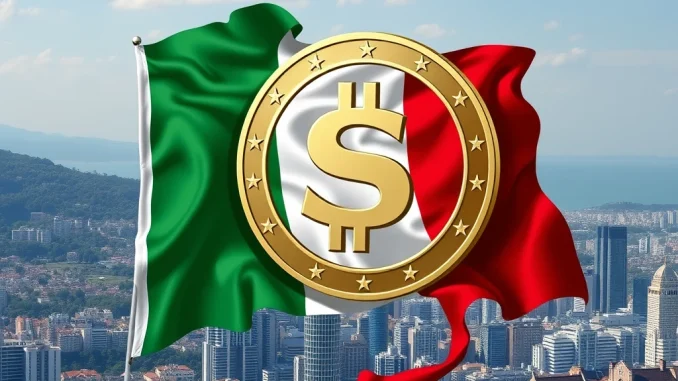
Hold onto your hats, crypto enthusiasts! A seismic tremor just hit the financial world, and it’s coming straight from Italy. Economy Minister Giancarlo Giorgetti has dropped a bombshell, declaring that U.S. stablecoin policies are not just a minor concern, but a full-blown threat to the euro’s financial sovereignty. Forget trade wars – this is a digital currency showdown brewing in the heart of Europe. Let’s dive deep into why Italy is sounding the alarm and what this means for the future of digital finance and the euro’s global standing.
Why Italy Warns Against US Stablecoins?
Giorgetti’s warning isn’t just political rhetoric; it’s rooted in a deep concern about the balance of power in the global financial landscape. The crux of the issue lies in the potential dominance of U.S.-backed stablecoins. Here’s a breakdown:
- Erosion of Euro’s Influence: Stablecoins, pegged to the U.S. dollar, could increasingly become the preferred digital currency for international transactions. This shift could gradually sideline the euro, diminishing its role in global payments and reserves.
- Financial Dependence: Over-reliance on U.S.-centric digital assets could make the European economy more susceptible to U.S. financial policies and regulations, impacting Europe’s economic autonomy.
- Monetary Policy Challenges: Widespread adoption of dollar-pegged stablecoins within the Eurozone could complicate the European Central Bank’s (ECB) monetary policy control and its ability to manage inflation and economic stability.
- Sovereignty at Stake: Ultimately, the concern is about maintaining Europe’s financial sovereignty – the ability to control its own financial destiny without undue influence from external powers.
Imagine a scenario where most cross-border payments in Europe are facilitated using U.S. dollar stablecoins. This isn’t just about currency preference; it’s about who controls the infrastructure and the rules of the game in the digital financial world.
The Specter of Financial Sovereignty: More Than Just Currency Wars
The term “financial sovereignty” might sound abstract, but its implications are very real. It’s about a nation’s or a region’s ability to govern its own financial system, make independent economic decisions, and protect its financial interests on the global stage. When Italy raises the alarm about euro sovereignty, it’s not just about protecting the value of the euro; it’s about safeguarding Europe’s economic independence.
Think of it like this:
| Aspect of Financial Sovereignty | Impact of Stablecoin Dominance |
|---|---|
| Monetary Policy Independence | Reduced effectiveness of ECB’s interest rate policies if transactions shift to dollar stablecoins. |
| Regulatory Control | Challenges in regulating stablecoins issued and governed outside the Eurozone, potentially leading to regulatory arbitrage. |
| Payment Systems Control | Increased reliance on payment systems and infrastructure controlled by entities outside the Eurozone. |
| Economic Stability | Potential vulnerabilities to external financial shocks and policy changes originating from the US. |
The rise of stablecoins, especially those backed by the U.S. dollar, introduces a new layer of complexity to this equation. While stablecoins offer benefits like faster and cheaper transactions, their widespread adoption, if unchecked, could inadvertently chip away at the euro’s foundations.
Digital Euro: Europe’s Countermove to Secure Financial Future?
Giorgetti’s warning isn’t just about pointing fingers; it’s also about proposing solutions. His call to action is clear: the EU must strengthen the euro’s international position and actively support the European Central Bank’s (ECB) digital currency project – the digital euro.
The digital euro is envisioned as a central bank digital currency (CBDC) for the Eurozone. It aims to provide a digital form of central bank money, offering a safe, efficient, and innovative payment solution for citizens and businesses. Here’s how the digital euro could be a game-changer:
- Reinforcing Euro’s Digital Presence: A digital euro would provide a European alternative to privately issued stablecoins, ensuring the euro remains relevant in the digital age.
- Promoting Financial Innovation: It can foster innovation in payment systems and financial services within Europe, reducing reliance on external solutions.
- Enhancing Monetary Policy Transmission: The digital euro could potentially improve the transmission of monetary policy and offer new tools for the ECB.
- Protecting Consumer Privacy: A CBDC could be designed with strong privacy protections, addressing concerns associated with some private digital currencies.
However, the digital euro is still in its development phase. The ECB is currently exploring its design and implementation, and there are numerous challenges to overcome, including technological hurdles, privacy considerations, and ensuring interoperability with existing payment systems.
US Regulation of Stablecoins: A Double-Edged Sword?
Interestingly, while Italy is expressing concerns, the U.S. is also moving towards regulating stablecoins more comprehensively. U.S. lawmakers are advancing legislation aimed at bringing stablecoins under a clearer regulatory framework. This might seem contradictory at first glance – the U.S. regulating stablecoins while Europe worries about their impact.
Here’s a nuanced perspective:
- U.S. Regulation – Ensuring Stability: From the U.S. perspective, regulation is primarily about ensuring the stability and integrity of stablecoins, protecting consumers, and preventing illicit activities.
- Potential Global Standard: U.S. regulations, given the dollar’s global dominance, could inadvertently set a de facto global standard for stablecoin regulation, influencing how other jurisdictions approach the issue.
- Europe’s Opportunity: Europe can leverage the momentum of global regulatory discussions to shape international standards in a way that aligns with its interests and protects its financial sovereignty.
- Coordination is Key: Ultimately, international coordination on stablecoin regulation is crucial to avoid fragmentation and ensure a level playing field in the global digital financial space.
The U.S. regulatory push could be seen as both a challenge and an opportunity for Europe. A challenge because it could solidify the dollar’s dominance in the digital realm if U.S.-regulated stablecoins become the global norm. An opportunity because it opens a window for Europe to actively participate in shaping the global regulatory landscape and advocate for a system that respects the principle of financial sovereignty for all nations.
Navigating the Digital Currency Crossroads: What’s Next?
The situation is dynamic and rapidly evolving. Italy’s warning serves as a wake-up call, highlighting the strategic importance of digital currencies and the need for Europe to act decisively. Here are some key takeaways and actionable insights:
- EU Must Prioritize Digital Euro: Accelerating the development and launch of the digital euro is paramount for Europe to maintain its financial sovereignty in the digital age.
- Strengthen Euro’s International Role: Beyond the digital euro, broader efforts are needed to enhance the euro’s attractiveness and usage in international trade and finance.
- Engage in Global Regulatory Dialogue: Europe should actively participate in international discussions on digital currency regulation, advocating for principles that promote a balanced and multi-polar global financial system.
- Foster Innovation within Europe: Supporting European fintech innovation and creating a favorable regulatory environment for digital finance within the EU is crucial to reduce reliance on external solutions.
The future of finance is undeniably digital. The race is on to define the rules of this new era. Italy’s urgent warning about U.S. stablecoins is not just a national concern; it’s a clarion call for Europe to assert its digital financial sovereignty and shape a future where the euro remains a strong and independent global currency.
Conclusion: Defending Euro Sovereignty in the Digital Age
The unfolding narrative around stablecoins and digital currencies is more than just a tech story; it’s a geopolitical chess game with high stakes. Italy’s stark warning underscores the vital importance of financial sovereignty in an increasingly digital world. As the U.S. moves to regulate stablecoins and Europe pushes forward with the digital euro, the coming years will be critical in determining the future balance of power in global finance. One thing is clear: Europe, and the EU, must act decisively and strategically to secure its financial future and ensure the euro’s continued relevance and strength in the digital age. The time to act is now, to defend euro sovereignty and shape the next era of global finance.



